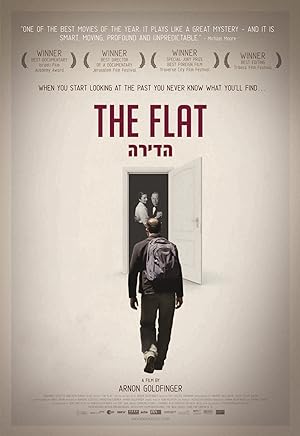The Flat is a documentary about the director’s family as they clean out his grandparents’ flat soon after his grandmother died. The Flat’s premise is extremely relatable, but what makes it interesting is the fact that his grandparents had to flee Nazi Germany for Palestine. The Flat confronts generational differences in dealing with traumatic history. The first generation knew it, but tried to forget it and rush headlong into the open arms of polite normalcy. The second generation was not interested because they were forbidden to confront it by the first generation. The third generation, which the director, Arnon Goldfinger, belongs to, is interested, but must consciously rediscover stories that were once known to the first generation of his family, but since forgotten and almost lost. People outside of his family, journalists and historians, know his family’s stories better than he or his family does, but in a purely theoretical way that does not emotionally or psychologically affect them, which is probably why they know his story.
George Santayana said, “Those who cannot remember the past are condemned to repeat it.” Even though Goldfinger is taking as light and polite an approach to WWII as possible, a personal human-interest angle, The Flat is still a stern rebuke of the perpetrators and the survivors of the Holocaust and their descendants for forgetting their stories albeit for understandable psychological and relational reasons. In The Flat, Goldfinger wants to reclaim and remember the past.
S
P
O
I
L
E
R
S
The Flat has a couple of big surprises. The Flat’s first reveal is that Goldfinger’s grandparents were travel buddies with one Nazi official responsible for early brainstorming of the Final Solution before and after WWII-he wanted all Jews to leave Europe and return to Israel. He meets with the Nazi official’s daughter, who claimed that she did research which exonerated her father, but is really in denial of her father’s role in WWII. Goldfinger and his mother hold off as long as possible before delivering the bad news, but they do and her denial seems as strong as ever. Goldfinger is understandably astonished that his grandparents could maintain a relationship with a Nazi couple, especially considering the second surprise.
The Flat’s second reveal is that one of his great grandparents was killed in the Holocaust, but the first generation seemed to imply something else happened to the second and third generation. For the first time in The Flat, Goldfinger’s mother seems shaken when she realizes that her grandfather’s grave may no longer exist as a symbol of the broader irrevocable and irretrievable loss.
The Flat is definitely a must see documentary, but at times, it can be repetitive and needed a little bit more editing. After watching The Flat, I had several thoughts.
First, if you are a Nazi and believe all Jewish people should leave your country, how did you have Jewish friends? Was it like all racism, and he would say something like, “I have Jewish friends so I’m cool and can say/do x?” I always thought that most Nazis were proudly racist, but I suppose everyone loves a sophisticated veneer.
Second, when Goldfinger’s grandparents left Germany and told their Nazi friends the news, did they both at some point say it was a good thing to each other, but for obviously different reasons and how was that NOT awkward.
Third, people hate confrontation. These Zionist grandparents made these Nazis feel comfortable. Even Goldfinger and his mother are concerned about the Nazi’s daughter. The Nazi’s daughter should not be blamed for her father’s actions. Shouldn’t she make them feel better and apologize for everything even just theoretically? I saw this shameless phenomenon in Moving Midway. I was surprised at how many imdb comments addressed how angry they were at Goldfinger for making the Nazi’s daughter uncomfortable. Seriously! His grandparents fled their beloved Fatherland and lost relatives in the Holocaust. Sure let’s make the Nazi’s daughter feel comfortable as she continues to live in her Fatherland and lives a blissfully unaware existence comfortable in a fake exoneration of her family’s past while simultaneously able to disapprove of Nazis.
Here are some lessons that everyone can learn from The Flat. Call your friends on their BS and let them know how their views affect you even if they don’t intend to hurt you. Embrace all your stories even your painful ones. Don’t let anyone take away your stories, even if your stories overlap with their stories. Anyone includes family. If they didn’t want their stories to be part of yours, then they should not have brought you into existence. You own your past. There is nothing wrong with apologizing and owning the truth, especially when you are not directly responsible for it, but absolutely necessary if you are.
Stay In The Know
Join my mailing list to get updates about recent reviews, upcoming speaking engagements, and film news.





